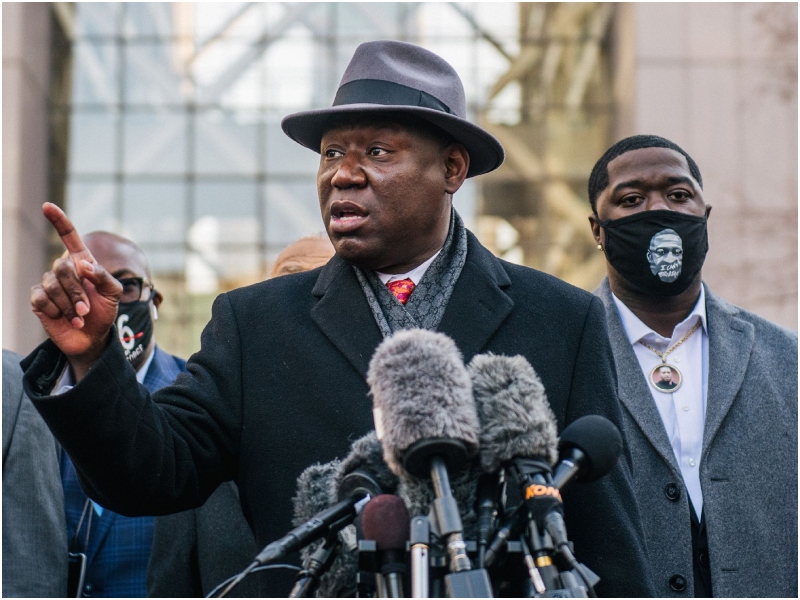Prominent civil rights attorney Benjamin Crump has joined the legal team representing Dr. Airica Steed, the former CEO of MetroHealth, in her discrimination lawsuit against the healthcare system.
Dr. Steed, who was terminated in August 2024, is challenging her dismissal, alleging it was rooted in gender and race discrimination.
Dr. Steed, who had been on medical leave at the time of her firing, claims she was informed of her termination through the media.
Her lawsuit, which also names MetroHealth’s Board of Trustees, asserts that her dismissal came shortly after she initiated a comprehensive internal investigation into serious ethical concerns raised by employees. Additionally, she had filed an internal complaint alleging gender and race discrimination.
Crump, known for his high-profile civil rights cases, has joined forces with the Sherman Boseman Legal Group, led by F. Allen Boseman, Jr., to advocate for Dr. Steed. In a statement, the legal team expressed grave concerns over the treatment of Dr. Steed, highlighting a pattern of behavior at MetroHealth that they believe warrants intense scrutiny.
“Dr. Steed exemplifies the very best in leadership, having not only met but exceeded the rigorous expectations set for her in a year filled with challenges,” the statement reads. “Her dismissal raises serious concerns about the standards to which Black women leaders are held in comparison to their counterparts and highlights a pattern of behavior at MetroHealth that deserves intense scrutiny.”
Dr. Steed was appointed CEO of MetroHealth in 2022, following the termination of her predecessor, Dr. Akram Boutros, who was dismissed after allegedly awarding himself $2 million in unauthorized bonuses. Despite being brought in to restore the organization’s reputation, Dr. Steed’s tenure was abruptly cut short, making her the second MetroHealth CEO in two years to face such a fate.
The MetroHealth Board of Trustees, in a statement, cited a fundamental disagreement over priorities and performance standards as the reason for Dr. Steed’s dismissal. E. Henry Walker M.D., Chair of the Board, stressed the board’s belief that Dr. Steed was not meeting the needs of the organization, stating:
“We have lost confidence in her ability to lead the organization going forward and believe it would not be in the best interest of the System for her to continue in her position.”
However, Crump and his legal team have strongly disputed this characterization, arguing that Dr. Steed’s performance reviews, including one issued in March 2024, showed that she met or exceeded expectations in key areas such as mission strategy, financial management, and community relations.
The review noted only a partial meeting of expectations in collaboration with physicians and highlighted challenges in building relationships with the board, which Dr. Steed attributed to the short time frame and significant barriers she faced during her first year.
Dr. Steed also voiced concerns about the lack of support and empowerment she received in her role, describing her experience as one of “walking on eggshells” and feeling “guilty until proven innocent.” She cited instances of intimidation and character assassination, particularly from her predecessor, which she believes further undermined her leadership.
The Cleveland NAACP has also condemned Dr. Steed’s termination, referring to it as a “public corporate lynching” in a statement that criticized the MetroHealth Board’s handling of the situation.
The NAACP praised Dr. Steed’s leadership and vision, which they believe significantly benefited the Northeast Ohio region during her brief tenure.
“We believe the decision to terminate Dr. Steed does not reflect the true value of her contributions to the community,” the NAACP’s statement reads. “The public approach the Board of Trustees took is disgraceful and unacceptable. The fact that Dr. Steed came to Cleveland to restore prominence to MetroHealth after their public scandal, only to be terminated without cause while on FMLA, is an indictment on MetroHealth.”
As the lawsuit proceeds, the case will likely draw significant attention, given the serious allegations of discrimination and the involvement of a high-profile civil rights attorney.
The outcome could have broader implications for how organizations address and manage issues of leadership, diversity, and discrimination in the workplace.

